Poetry of Peace in the Nobel Lectures at Oslo City Hall
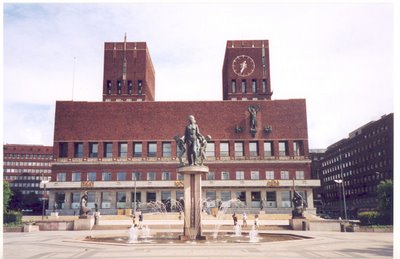
where the Nobel Peace Prize lectures are delivered.
Below are excerpts from the Nobel lectures of 16 Peace prize winners. Each excerpt contains a thought of poetry in relation to peace. They are in chronological order, by Peace Prize winner.

from his Nobel Lecture: Peace and Law in the Italian Tradition:
Your choice was all the more pleasing to my fellow countrymen in coming from a country we have loved for a very long time for its devotion to truth and beauty, for its civic institutions, and for its poets and dramatists, such as Ibsen and Bjørnson who are among the most admired and most widely read in Italy.
Our revolution did not explode in a sudden uprising of people intolerant of a tyrannical regime; it was the result of a long period of intellectual and moral evolution, brought about by men of great talent and of rare spiritual qualities, poets and philosophers, true educators of the people. In speaking of liberty and patriotism, all of them taught that liberty may be won by risking death, but it is preserved only by adherence to the principles of justice and through acts of civic virtue.
Histories of ancient Rome, such as those by Livy and Dionysius of Halicarnassus, are full of accounts of popular protests and of episodes concerning the way in which the common people of Rome resisted the war-mongering and conquering policies of the Senate; it was, indeed, the Latin poets and philosophers who called war "horrida bella" or "bella matribus detestata".
Although in the realm of ethics Cicero was far ahead of his time, he was not alone in propounding such ideas. The Epicurean poet Lucretius, in his poem about the Roman world, marked the contrast of its internal strife and the horrors of its wars with the placid tranquillity of the sage who, from the heights of the austere temple of knowledge, contemplates the senseless conflicts of men. And when Augustus brought these conflicts to an end, there was a host of high-minded individuals, such as Vergil, Horace, Pliny, Seneca, and all the Stoics, who extolled the peace.
Dante saw the danger and the pity of this division into jealous and antagonistic city states. In his poem, attacking parties, he says in an immortal line that Italy, "no longer the mistress of provinces," has become the slave of cruel and pitiless sects.
This masterpiece in which Dante sets forth the fundamentals of his doctrine can be said, if one discards the now obsolete part which was adapted to his own day and to the metaphysics of Aristotle, to present the rules of government and of humanitarian life under one law; to this end, he wanted the Empire transferred to Rome, for he perceived in the Romans those qualities most suited to governing the world.
The purpose of civilization, he said, is to put man's intellectual potential to practical use, in short, to develop his faculties to their fullest extent.
The orator of the "Mille" himself, the poet Abba, in the presence of the King at Rome, commemorated that great event by expressing the thought which was then and still is uppermost in the minds both of the people and of the government; he closed his speech by saying that Italy had risen again to accomplish the mission of peace with which history and her position in Europe had charged her. It is now known, even outside Italy, that there is no longer in our country any party agitating for war.
Consider the way that poets, with few exceptions, pay court to fame and popularity by singing the praises of war and massacre. Consider again how the most sublime virtues are always associated with the national flag while cruelty is ascribed to the enemy alone--this in order to sustain mistrust, hatred, and enmity between nations.
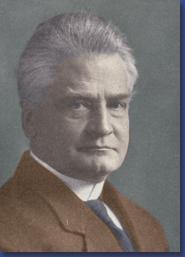
from his Nobel Lecture: Internationalism:
The past dies hard because the contemporary political organizations or holders of power seldom bend themselves willingly to the needs of the new age, and because past glories and traditions generally become transformed into poetic or religious symbols, emotional images, which must be repudiated by the practical and prosaic demands of the new age. Within each such social group, a feeling of solidarity prevails, a compelling need to work together and a joy in doing so that represent a high moral value.

from his Nobel Lecture: The New Germany:
I tried to make the point that the man who cultivates to the highest degree the qualities inherent in his national culture will gain insight into universal knowledge and feeling which transcend the limitations of his own heritage; and he will create works which, like cathedrals, although built upon the soil of his native land, will soar into the heaven of all mankind. A Shakespeare could have arisen only on English soil. In the same way, your great dramatists and poets express the nature and essence of the Norwegian people, but they also express that which is universally valid for all mankind. Dante can be understood only within the context of Italian thought, and Faust would be unthinkable if divorced from its German background; but both are part of our common cultural heritage. They break the bonds which bind them to their own nations, yet they are great only because their inspiration is so firmly rooted in their own countries.

from her Nobel Lecture: Toward Human Unity or Beyond Nationalism:
If UNESCO succeeds, as it well may, in securing the general adoption of a universal auxiliary language, such as the International Language Association is now engaged in selecting and elaborating, it will be the dawn of a new day in literature such as the world has hardly dreamed of. None of the natural languages will be tampered with, reformed, or cut down to a restricted base. But all men who can read and write may command an idiom universally understood. This will not only be an enormous advantage in business, in travel, and in all sorts of practical ways. Far more important will be its service in the world of ideas. Poets and the great writers will have open to them a reading public including not only all European and American peoples but the Chinese, the Arabs, the island peoples, and the people of Africa, who may yet make a great contribution. Music and mathematics already command a universal notation not yet available for the expression of thought. Such a public for the printed and spoken word, comparable to that for music, would give an immense impetus to world literature.

from Nobel Lecture: Refugee Problems and Their Solutions
by Dr. Gerrit Jan van Heuven Goedhart:
Alfred Nobel was a lonely man, or, in a sense, a "displaced person", a "homeless foreigner". He was by birth and passport a Swede, but in his later days he spoke not so much his mother tongue, of which he had an unusual command, but mostly English, a language in which he wrote remarkably beautiful poetry. Whereas we may be inclined to combine Nobel's name with the image of a hardboiled businessman, an extremely successful money-maker, Alfred Nobel was in reality a poet, a dreamer, an adventurer in science, an idealist at heart, a philosopher in essence--he did, in fact, leave a sketch for a novel in which he advocated a form of government along Platonic lines.
In my office in Geneva I have hanging on the wall, written by a hand quite unaccustomed to writing, a short German poem which my father found in a caravan of gypsies whom he visited when they passed our little Dutch village many years ago:
Der Mensch braucht ein Plätzchen
Und wär's noch so klein
Von dem er kann sagen:
Siehe hier das ist mein,
Hier lebe ich, hier liebe ich,
Hier ruhe ich aus,
Hier ist meine Heimat,
Hier bin ich zu Haus.
How wholeheartedly would the lonely man, at the villa "Mio Nido", have agreed to that! A man needs a little place, small as it may be, of which he can say: "This is mine. Here I live, here I love, here I find my rest. This is my fatherland, this is my home!"

from his Nobel Lecture: The Four Faces of Peace:
I would like, at the very beginning, to pay my tribute to the memory of a great man, Alfred Nobel, who made this award--and others--possible. Seldom in history has any man combined so well the qualities of idealism and realism as he did--those of the poet and the practical man of business. We know all about his dynamite and his explosives and how he lamented the use to which they would be put. Yet ideas can also be explosive, and he had many that were good and were deeply concerned with peace and war. He liked to write and talk about the "rights of man and universal brotherhood", and no one worked harder or more unselfishly to realize those ideals, still so far away.

from his Nobel Lecture: Africa and Freedom:
The address could do no more than pose some questions and leave it to the African leaders and peoples to provide satisfying answers and responses by their concern for higher values and by their noble actions that could be
Footprints on the sands of time.
Footprints, that perhaps another,
Sailing o'er life's solemn main,
A forlorn and shipwrecked brother,
Seeing, shall take heart again.
[from "A Psalm of Life" by Henry Wadsworth Longfellow]
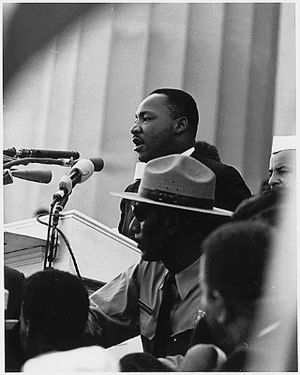
from his Nobel Lecture: The Quest for Peace and Justice:
Every man lives in two realms, the internal and the external. The internal is that realm of spiritual ends expressed in art, literature, morals, and religion. The external is that complex of devices, techniques, mechanisms, and instrumentalities by means of which we live. Our problem today is that we have allowed the internal to become lost in the external. We have allowed the means by which we live to outdistance the ends for which we live. So much of modern life can be summarized in that arresting dictum of the poet Thoreau: "Improved means to an unimproved end". This is the serious predicament, the deep and haunting problem confronting modern man.
In the final analysis, the rich must not ignore the poor because both rich and poor are tied in a single garment of destiny. All life is interrelated, and all men are interdependent. The agony of the poor diminishes the rich, and the salvation of the poor enlarges the rich. We are inevitably our brothers' keeper because of the interrelated structure of reality. John Donne interpreted this truth in graphic terms when he affirmed:
No man is an Iland, intire of its selfe: every
man is a peece of the Continent, a part of the
maine: if a Clod bee washed away by the Sea,
Europe is the lesse, as well as if a Promontorie
were, as well as if a Mannor of thy friends
or of thine owne were: any mans death
diminishes me, because I am involved in
Mankinde: and therefore never send to know
for whom the bell tolls: it tolls for thee.

from his Nobel Lecture: The Charter of Human Rights:
It is with great feeling that I take my leave of this country where peace and law are so highly esteemed. So perhaps you will permit a French citizen committed to the service of peace and law to recall, as indicative of faith in mankind, these two lines from a French poet who received one of the first prizes, the Nobel Prize in Literature:
My country imbues me with a love that overflows its borders,
And the more French I am, the more I feel a part of mankind19.
[by Sully Prudhomme (1839-1907)]

from her Nobel Lecture:
Someday we must take seriously the words of Carl Sandburg: "Someday there will be a war, and no one will come". Won't that be beautiful? Someday there will be a "war" but no one will come. And of course, if no one comes there will be no war. And we don't have to go, we don't have to have war, but it seems to take more courage to say NO to war than to say YES, and perhaps we women have for too long encouraged the idea that it is brave and manly to go to war, often to "defend" women and children. Let women everywhere from this day on encourage men to have the courage not to turn up for war, not to work for a militarized world but a world of peace, a nonviolent world.

from Nobel Lecture:
The victims of arbitrary arrest and detention come from all walks of life: workers, peasants, lawyers, journalists, professors. Among them also are the voices of the human imagination, painters, actors and actresses, film-makers and dancers, musicians, poets.
Some time ago, one of them, now dead, was able to send a letter from prison in which she wrote:
"They are envious of us. They will
envy us all.
For it is an enviable but very difficult
task to live through a history as a human
being, to complete a life as a human being.
Soon the night will fall and they will
close the doors of the cell.
I feel lonely.
No . . . I am with the whole of mankind.
And the whole of mankind is with me".
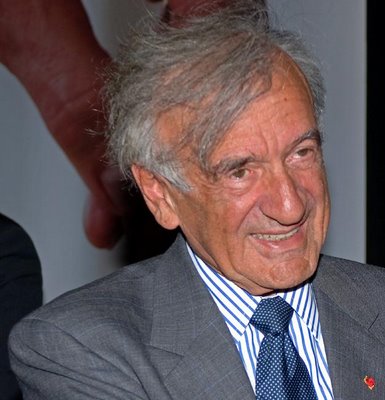
from his Nobel Lecture: Hope, Despair and Memory:
And yet real despair only seized us later. Afterwards. As we emerged from the nightmare and began to search for meaning. All those doctors of law or medicine or theology, all those lovers of art and poetry, of Bach and Goethe, who coldly, deliberately ordered the massacres and participated in them. What did their metamorphosis signify? Could anything explain their loss of ethical, cultural and religious memory? How could we ever understand the passivity of the onlookers and--yes--the silence of the Allies?
The great historian Shimon Dubnov served as our guide and inspiration. Until the moment of his death he said over and over again to his companions in the Riga ghetto: "Yidden, shreibt un fershreibt" (Jews, write it all down). His words were heeded. Overnight, countless victims become chroniclers and historians in the ghettos, even in the death camps. Even members of the Sonderkommandos, those inmates forced to burn their fellow inmates' corpses before being burned in turn, left behind extraordinary documents. To testify became an obsession. They left us poems and letters, diaries and fragments of novels, some known throughout the world, others still unpublished.
After the war we reassured ourselves that it would be enough to relate a single night in Treblinka, to tell of the cruelty, the senselessness of murder, and the outrage born of indifference: it would be enough to find the right word and the propitious moment to say it, to shake humanity out of its indifference and keep the torturer from torturing ever again. We thought it would be enough to read the world a poem written by a child in the Theresienstadt ghetto to ensure that no child anywhere would ever again have to endure hunger or fear. It would be enough to describe a death-camp "Selection", to prevent the human right to dignity from ever being violated again.

from his Nobel Lecture: Only Peace Can Write the New History:
Poets who are the pride of mankind know that millions upon millions cannot read them in their own countries, because so many of the men and women there are illiterate. There are on this narrow strip of land painters and sculptors whom we shall admire for ever, but also dictators whom we have no wish to remember because they offend most cherished human values.
I say to the poet
The peace plan which we five presidents signed accepts all the challenges. The path to peace is difficult, very difficult. We in Central America need everyone's help to achieve peace.
It is easier to predict the defeat of peace in Central America than its victory. That is how it was when man wanted to fly, and when he wanted to conquer space. That is how it was in the hard days of the two world wars which our century has known. That is how it was and still is as man confronts the most dreadful diseases and the task eliminating poverty and hunger in the world.
History was not written by men who predicted failure, who gave up their dreams, who abandoned their principles, who allowed their laziness to put their intelligence to sleep. If certain men at times were alone in seeking victory, they always had at their side the watchful spirit of their peoples, the faith and destiny of many generations.
Perhaps it was in difficult times for Central America, like those we are living through today, perhaps it was in premonition of the present crossroads, that Rubén Dario, our America's greatest poet, wrote these lines, convinced that history would take its course:
"Pray, generous, pious and proud;
pray, chaste, pure, heavenly and brave;
intercede for us, entreat for us,
for already we are almost without sap or shoot,
without soul, without life, without light, without Quixote,
without feet and without wings, without Sancho and without God".
I assure the immortal poet that we shall not cease to dream, we shall not fear wisdom, we shall not flee from freedom. To the eternal poet I say that in Central America we shall not forget Quixote, we shall not renounce life, we shall not turn our backs on the spirit, and we shall never lose our faith in God.
I am one of those five men who signed an accord, a commitment which consists, very largely, in the fact of desiring peace with all one's soul.
Thank you.

from his Nobel Lecture:
One of the great poets in Afrikaans, N P van Wyk Louw, wrote:
"O wye en droewe land, alleen
onder die groot suidersterre.
Sal nooit'n hoe blydskap kom
deur jou stil droefenis? ...
Sal nooit'n magtige skoonheid kom
oor jou soos die haelwit somerwolk
wat uitbloei oor jou donker berge,
en nooit in jou'n daad geskied
wat opklink oor die aarde en
die jare in hul onmag terge;..."
Translated freely it means:
"Oh wide and woeful land, alone
Beneath the great south stars.
Will soaring joy ne'er rise above
Your silent grief?
Will ne'er a mighty beauty rise
above you, like the hail-white summer clouds
that billow o'er your brooding peaks
and in you, ne'er a deed be wrought
that over the earth resounds
and mocks the ages in their impotence?"
What is taking place in South Africa is such a deed--a deed resounding over the earth--a deed of peace. It brings hope to all South Africans. It opens new horizons for Sub-Saharan Africa. It has the capacity to unlock the tremendous potential of our country and our region.

from his Nobel Lecture:
"God takes pity on kindergarteners", wrote the poet Yehudah Amichai, who is here with us tonight,
"God takes pity on kindergarteners,
Less so on schoolchildren,
And will no longer pity their elders,
Leaving them to their own.
And sometimes they will have to crawl on all fours
Through the burning sand
To reach the casualty station
Bleeding."
For decades God has not taken pity on the kindergarteners in the Middle East, or the schoolchildren, or their elders. There has been no pity in the Middle East for generations.
I am the emissary of the poets and of those who dreamed of an end to war, like the Prophet Isaiah.
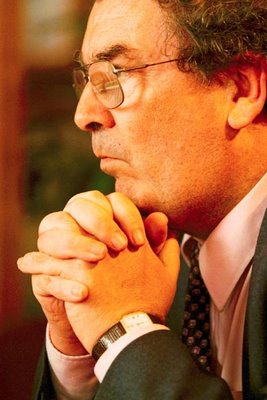
from his Nobel Lecture:
The Irish poet, Louis MacNiece wrote words of affirmation and hope that seem to me to sum up the challenges now facing all of us--North and South, Unionist and Nationalist--in Ireland.
"By a high star our course is set, Our end is life. Put out to sea."
That is the journey on which we in Ireland are now embarked.

2 Comments:
You put so much work into your posts-- this one's impressive!
Nice that the laureates mention poets and philosophers, although they are not always a good influence, if you consider Nietszche and Marx and perhaps the libertinism of Byron, even the complete complicity with upper class culture to which Alexander Pope adhered.
Poets get way too much credit from people who don't read them.
Hi CE,
Above, Elie Wiesel touches on a corollary to what you say, and Ernesto Teodoro Moneta makes a direct hit on the spirit of your comment when he say this:
Consider the way that poets, with few exceptions, pay court to fame and popularity by singing the praises of war and massacre. Consider again how the most sublime virtues are always associated with the national flag while cruelty is ascribed to the enemy alone--this in order to sustain mistrust, hatred, and enmity between nations.
Moneta's statement may have been one of the wake-up calls that led to the strong anti-war sentiments of so many poets today, a sort of awakening that led to (or was leading to) Owens. Of course, we still have the Pounds and probably always will.
At its essence, your point begs that the poet be defined--how is one to use the term "poet"--or, do we mean a Poet with a capital "P" or one of the lower cases.
As you probably know, the following is what Walt Whitman said, not about Peace, but Liberty, in his Preface to Leaves of Grass:
In the make of the great masters the idea of political liberty is indispensable. Liberty takes the adherence of heroes wherever men and women exist . . . but never takes any adherence or welcome from the rest more than from poets. They are the voice and exposition of liberty. They out of ages are worthy the grand idea . . . to them it is confided and they must sustain it. Nothing has precedence of it and nothing can warp or degrade it. The attitude of great poets is to cheer up slaves and horrify despots.
Thanks very much.
Bud
Post a Comment
<< Home